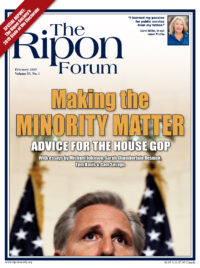
Last November, the GOP experienced a sharp drop in voter support in America’s suburbs. It was a critical reason Republicans lost the House majority. Winning back suburban voters is achievable if we can execute a plan along the following lines:
-Create a dialogue with voters that is more inclusive and less polarizing.
-Focus our conversation with constituents on issues that are most important to them and their families.
-Recruit and support more female candidates.
The ongoing “war” between the White House and the media has created an increasingly toxic political environment that has turned off many suburban and moderate voters. These groups are critically important to Republican electoral success.
It would probably benefit Republicans greatly to take a page from President Ronald Reagan’s playbook. His reputation as the Great Communicator was well-earned. He was relentlessly optimistic. His approach was always simple, clear, and caring.
The ongoing “war” between the White House and the media has created an increasingly toxic political environment that has turned off many suburban and moderate voters.
In recent years, media coverage of the Hill has produced voters’ perceptions of chaos and a “dis-connection.” In the last Congress, Republicans made significant strides in many areas that received scant media attention – it didn’t fit the “conflict politics” storyline that the media wanted to report.
Republicans should assume that this is unlikely to change through the 2020 election cycle. It’s important to GOP candidates, therefore, to create as many of their own direct-to-constituent communications channels as possible. Connect with voters by articulating a positive vision with compassion. Develop creative ways to use social media and have in-person, in-district “kitchen table” conversations with constituents.
Republicans have actively pursued real solutions to issues that are top-of-mind with suburban and moderate voters — the kinds of things that will make a real difference in the everyday lives of those voters. As House Republican Leader Kevin McCarthy has said repeatedly in recent weeks, Republicans will continue to “put people before politics.”
These key issues include:
- Health care
- The economy
- National security
Health care frequently tops the list of voters’ concerns. In my experience, suburban voters are less concerned about whether we repeal Obamacare or move to a Medicare for All system. They are more concerned about the practical issues of day-to-day living—getting drug prices down, seeing the doctor of their choice, and finding cures of diseases like cancer, diabetes, Alzheimer’s, and more. In this case, it’s putting patients before politics.
This is an area in which a Republican-led Congress made greater strides than the media coverage might have voters believe. For example, in 2016, Congress passed the 21st Century Cures Act. The law provides $4.8 billion over ten years in additional funding to the National Institutes of Health. It also streamlines regulation and increases funding to speed up the development of life-saving drugs, reform our mental health system, and provide resources to battle the opioid crisis.
Republicans have actively pursued real solutions to issues that are top-of-mind with suburban and moderate voters — the kinds of things that will make a real difference in the everyday lives of those voters.
Another law passed that received too little media attention—the Right to Try law—was enacted last year. It allowed terminally ill patients to get access to experimental drugs to extend their lives. Americans with terminal diseases don’t have many options. Once diagnosed, they don’t have much time. They should be able to access treatments that could potentially prolong their lives. Right to Try allows patients to try treatments that have passed FDA safety testing but have not yet received final FDA approval. Having an extra few months with loved ones can make all the difference for terminally ill patients and their families.
Putting people ahead of politics must continue to define the GOP vision for health care.
As to the economy, few issues occupy voters’ minds more. Millions of Americans sitting around their kitchen tables want not only to be able to make ends meet, but they want a future of greater opportunities for themselves and their children. The GOP must emphasize its commitment to those goals and bring greater attention to the job growth we’ve experienced over the past few years as well as the middle-class benefits of tax reform.
National security is very important to suburban voters. I believe that securing the homeland means more to most voters than just national defense, which of course, is important.
But we need to pay even greater attention to preventing domestic acts of terror. Making our schools safe is of the utmost importance. As a single mother, the last thing I want to have to worry about is whether my daughter will be safe at school. Our loved ones must be safeguarded from random acts of violence, especially our children.
To improve school safety, the Republican-led Congress passed the Stop School Violence Act, and included resources to help identify threats and prevent violence from taking place on school grounds. When local schools receive funding and resources, America’s superintendents, teachers, and parents can best determine what methods can be implemented to keep their kids safe. It’s a good start and one we need to build upon.
Lastly, we need to work to recruit more women candidates. The number of women in Congress is at an all-time high – today, 102 women serve in the House and 25 in the Senate.
While this represents movement in the right direction, it isn’t one in which the GOP has fully participated. Of the 25 female Senators, only 8 are Republicans. Similarly in the House, only 13 of the 102 women now serving are Republicans.
I think the trend of female participation in politics is only going to grow and accelerate. The GOP must make it a priority to identify, train, and support viable female candidates.
In conclusion, as we look toward 2020 and beyond, Republicans need to keep putting people ahead of politics by continuing to work on the issues that profoundly impact our constituents in everyday life.
Having a positive vision of the future and articulating that vision with a compassionate voice will have a much greater appeal to a broader slice of the electorate, including suburban and moderate voters.
And offering the opportunity to elect more diverse and talented candidates will also appeal to those voters in suburban districts.
This is the path forward that members of the Republican Main Street Partnership are working on to create the tomorrow of opportunity that Americans want for themselves and future generations.
Sarah Chamberlain Resnick is the President of the Republican Main Street Partnership.




